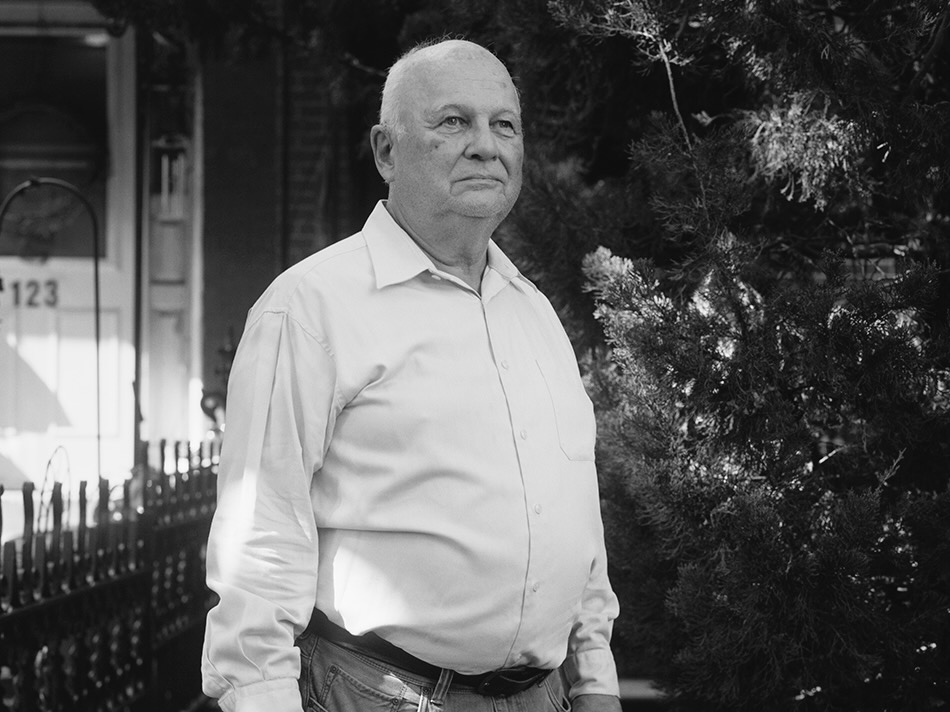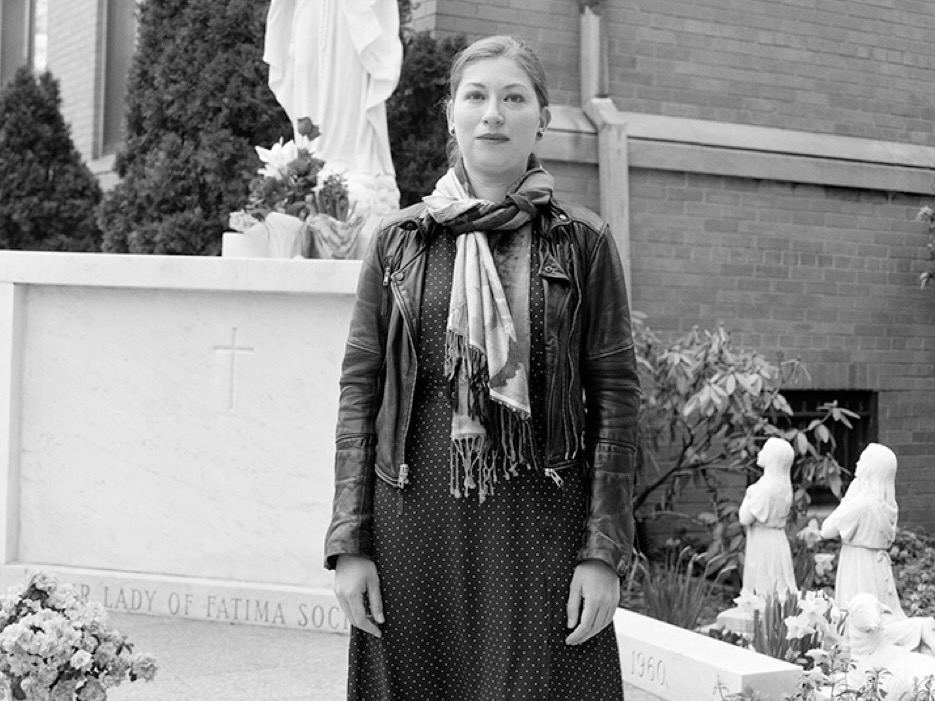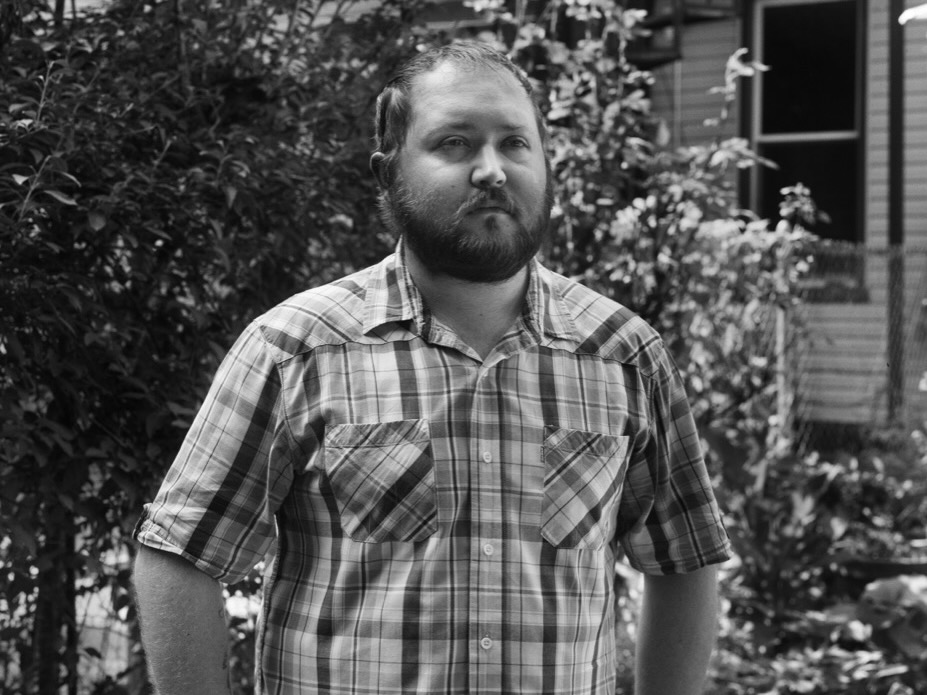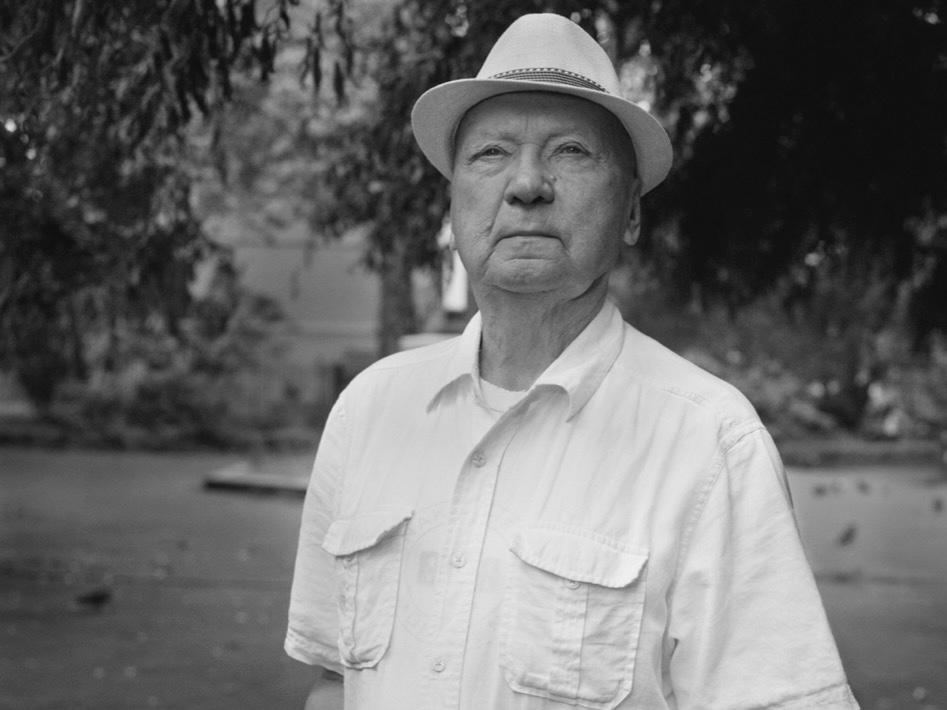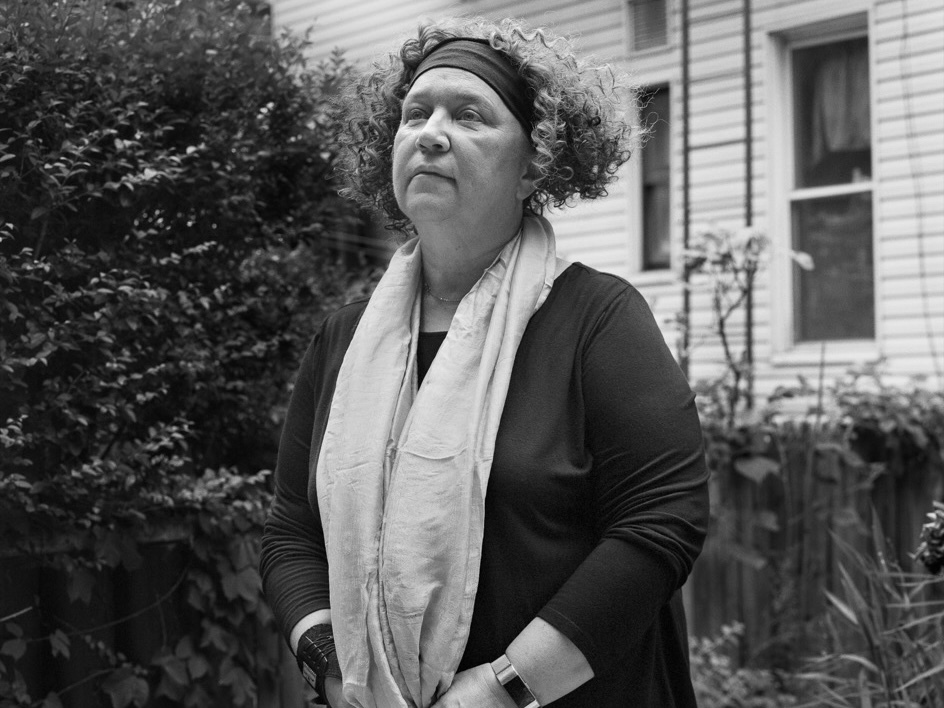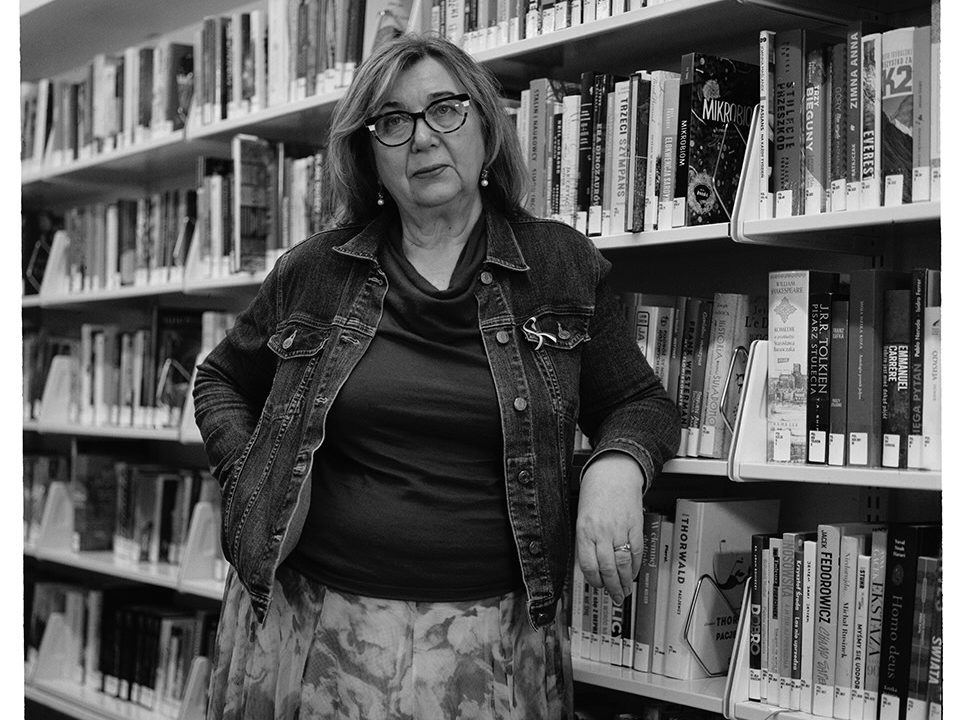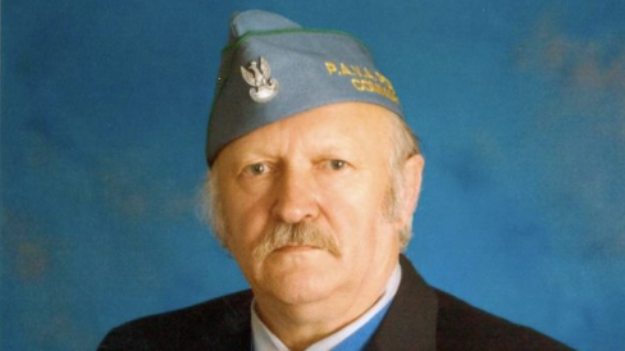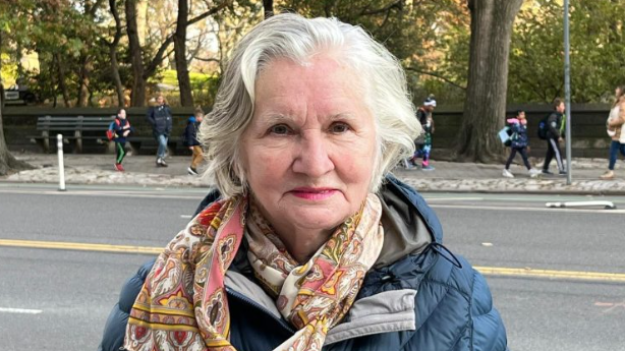
The changes in Greenpoint are that old tenants are being thrown out to let the modern American generation pay more for renting apartments in this neighborhood. I’m trembling about what will happen with the rent.
In Germany, we lived with my husband and daughter for almost a year in a transit camp for refugees. Then we had to decide where to go. My daughter was about to start the second class. My husband dreamed of this America, and that’s how we landed at the consulate in Frankfurt. The Americans were to accept us, there would be no shame in letting us in.
We went for an interview at the embassy. Not knowing English, I was very stressed. We entered the room, and smiling gentlemen showed us the chairs. Then, through an interpreter, they asked: What does July 4th mean to me? I replied without thinking that it was my birthday. They did not ask any more questions.
We had Green Card numbers, a Social Security number, and a work permit from the beginning. We landed in Brooklyn, lower first. My daughter was eight and had just finished her first class in Germany. It wasn’t easy for her in Germany, but she was just strong.
Finding an apartment was difficult because landlords in Greenpoint were afraid of children. Yes, Polish landlords. They wavered: maybe we’ll rent it, maybe we won’t; after all, throwing out a family with a child is challenging.
We finally found an apartment near Greenpoint, in the Italian part of Brooklyn. There was also a Polish girl in this house, my daughter’s age. We were pleased about this: in the United States, an adult must walk a child under the age of 12 to and from school. We could help each other. It was invaluable for a family who wanted to save some money.
My husband started working in asbestos removal, and when I was looking for a job, I was thinking about my experience in Germany. I worked there in a Turkish restaurant as a waitress. This allowed me to work flexible hours and take care of my daughter.
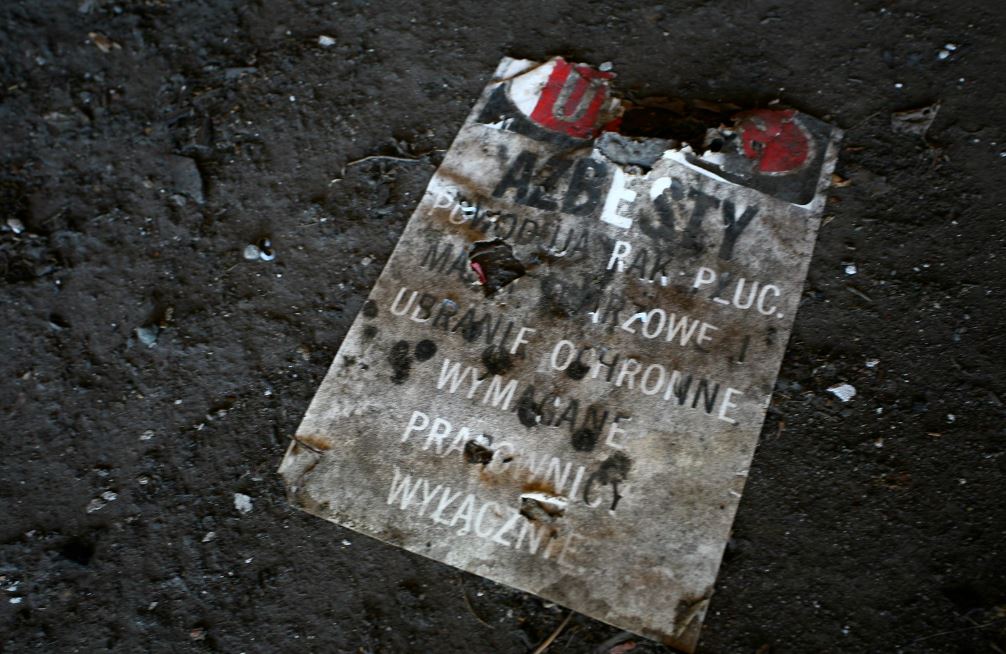
I got a job at the “U Henryka” restaurant, which was located on Norman Street. Henryk from Łomża led it. The restaurant had alcohol and Polish dishes: soups and main courses. Many customers were surprised that Henryk hired a waitress from Kraków, as he usually only employed people from Łomża.
His clients were also mainly from Łomża. Ninety-eight percent were single men coming to the restaurant to drink and eat on Sundays and holidays. They usually worked on asbestos removal, so they had money and earned very well. Did the blonde feel safe at Mr. Henryk’s place? I will say it was pretty safe there.
Safety is a matter of professionalism. You have to be friendly to customers and keep them at a distance. When the hormones were buzzing, of course, it happened that someone accosted me from time to time, but thanks to her personality, the waitress demanded respect. I had offers like: would you go out with me? But refusal did not cause aggression in customers.
Working in Germany was more problematic. I had to commute to a Turkish restaurant near Nuremberg. After refusing to make an appointment with a client, I often found punctured car wheels in the parking lot.
While working for Henryk from Łomża, I quickly started learning English in the Polish school on Manhattan Avenue. I did not think about further university education. We had a baby, and I didn’t know if we’d be staying here for long.

But I was still thinking about personal development, so I found an advertisement from a restaurant in Manhattan. The owner was of Ukrainian descent, and his name was Bruno. He only hired Polish women as waitresses, just like restaurants Christina’s or ‘Teresa’s, famous for employing Polish women.
A hundred girls came for the interview. Bruno started talking to me in English. I told him that if he wanted to know something about me, he should ask in Polish. Bruno knew Polish, so we managed to talk. What made him accept me? I was a married woman with a child, a stable, working woman. I wasn’t afraid of work. I was only scared of the English menu. And I wanted to work before noon.
Yes, everyone was surprised that I was promoted to Manhattan. Friends, wives of my husband’s friends, and Mr. Henryk would say: With no English in Manhattan?
And I started a new adventure. By ‘adventure,’ it quickly became apparent why this Bruno often changes Polish employees. Because he was crazy, he would come into the kitchen, taste the soup, spill the whole pot on the floor, and leave. Or throw away the plates that came out of the kitchen and also leave the restaurant.
There was a basement, a so-called storage, and if the girl did something wrong, he would say: ‘Go to the basement for an hour and think about your mistakes.‘ He was a little hotheaded, so he could also jerk so that bruises were left.
But that’s fine for me. Perhaps he had respect for me because I had a husband and child. He wasn’t abusive, he wasn’t a jerk, and he was even funny occasionally.
At Bruno’s place, I was able to cope with the language. Except for weekends, when it was packed and loud, I would get lost if someone ordered something non-standard. Then I asked my friends, although not all of them wanted to help. I came home from work exhausted from the mental exertion but satisfied with my promotion.

When you come to America from Germany, you experience a great shock.. German social welfare allowed you to save money, dress beautifully, and have fun. In America, you have to fight for everything.
Nevertheless, everything began to fall into place slowly. We found a group of friends from Krakow. We spent weekends in friendly, cultured company.
And I wanted to grow again. Finally, it happened. The information came from people who dealt with asbestos because everything in Greenpoint revolved around them. A colleague who worked there said that his friend had bought a Manhattan Avenue restaurant. She’d done so with a partner, but they’d already gone their separate ways. Business was slow, even though it was an almost elegant place, with instances of any inconvenience being rare.
Friends suggested that I help her. The most common mistake of Polish restaurateurs is trickery. There are classic things on the menu that are obvious to Americans, such as Western Omelet breakfasts. And you can’t, I think, dwell on them. And she had a super-hyper cook from Warsaw, who did it his way. He was ambitious. When an American ordered a Western Omelet, he got a novelty from Poland and never returned to the restaurant. Here you need to know that a hamburger is a hamburger. These novelties can be introduced in Polish dishes.
I told him that he was doing it wrong, that he had to use such and such ingredients. Pancakes and French toast are not dishes to show off but to replicate.
I only sometimes got along with this cook. He had remarked that I was too bossy. The owner supported me, as she was a strong woman who also worked with asbestos. She put a lot of money into this business but needed to learn more about the kitchen. She could clean up, but the servers cheated on her. Finally, she decided that she was not fit for this business. She said, ‘Krystyna, you have to buy this.‘
I thought and thought about it. Each month gave me more certainty. I was no longer afraid that I wouldn’t remember my orders. I felt how my horizons were opening up. In September 1993, we bought this business. We put all our savings into it, and the rest we borrowed from friends. Then the real work began. My husband and I worked from morning to evening. We moved close to the business to avoid wasting time commuting to work. In the morning, I prepared the restaurant. I worked as a waitress in the afternoon, and my husband did deliveries. We bought the ingredients slowly; one can at a time. In order not to get into debt. First, we hired someone to clean up. Then a girl to wait in the mornings when I ran to freshen up. I was coming back to the restaurant in the afternoon, and the girl was going to school. The business began to develop

How did we conquer Greenpoint? By international approach and elegance. There were a lot of eateries, i.e., bars, in the district. You went straight to the cash register, then the lady from the window shouted: ‘Schabowy!‘. Men ate at these places and then went to the bar or the liquor store for alcohol. ‘Restaurant,’ ‘waitress,’ ‘tips’ – these words scared off specific customers. We took a risk. We called ourselves ‘Christina’s Restaurant’ and offered a bilingual menu.
Polish restaurants have not done this so far, maybe Stylowa. We were the third place in Greenpoint to employ servers. We chose the prettiest ones, and soon Christina became famous for the beauty of the servers. They had to speak English. In the competitive Rzeszowska Restaurant, however, they did not understand much of the language. This was new to Greenpoint.
Our success was also caused by my husband and I being legally in the States. Already at Bruno’s place, I was one of the few employees who stayed here legally. I had access to the restaurant papers, signed them, and carried documents to Bruno’s accountant. I asked questions whenever possible. I learned the secrets of running such a place. Simply: Bruno could prove me in the documents. When I bought the restaurant, I immediately went to the same accountant. I knew her as a person; I knew I could trust her and would be well-guided.
When the restaurant became popular and busy, my husband’s mother came to America. She helped us so that we could devote ourselves even more to work. And she was earning extra money for her retirement. Around that time, I fell in love with Greenpoint and felt at home and safe. The conditions were familiar here. I will give an example of Mr. Marek from a nearby pharmacy. Everyone knows him because you can always ask him for advice, help, and even medicine before the prescription arrives. Mr. Marek acted as a district doctor. I could send employees to him with a request: this and that medicine is needed for Mrs. Krystyna. Great comfort, believe me.
Since I could hire staff, I had some time to myself. It has been so until today. Of course, I’ve heard malicious comments. There were rumors that I dressed too elegantly, had my hair done, and did nothing but take care of myself. I don’t care. Why can’t I look good? What’s wrong with ladies dressing up nicely?
How did we conquer Greenpoint? By an international approach, and elegance. There were a lot of eateries, i.e., bars, in the district. You went straight to the cash register, then the lady from the window shouted: ‘Schabowy!‘. Men ate at these places and then went to the bar or the liquor store for alcohol. ‘Restaurant,’ ‘waitress,’ ‘tips’ – these words scared off certain customers. We took a risk. We called ourselves ‘Christina’s Restaurant’ and offered a bilingual menu.
Polish restaurants had not done this so far, maybe Stylowa. We were the third place in Greenpoint to employ servers. We chose the prettiest ones, and soon Christina became famous for the beauty of the servers. They had to speak English. In the competitive Rzeszowska Restaurant, however, they did not understand much of the language. This was new to Greenpoint.
Our success was also due to the fact that my husband and I were legally in the States. Already at Bruno’s place, I was one of the few employees who stayed here legally. I had access to the restaurant papers, signed them, and carried documents to Bruno’s accountant. I asked questions whenever possible. I learned the secrets of running such a place. Simply: Bruno could confirm me in the documents. When I bought the restaurant, I immediately went to the same accountant. I knew her as a person; I knew I could trust her and would be well-guided.
When the restaurant became popular and busy, my husband’s mother came to America. She helped us so that we could devote ourselves even more to work. And she was earning extra money for her retirement. Around that time, I fell in love with Greenpoint and felt at home and safe. The conditions were familiar here. I will give an example of Mr. Marek from a nearby pharmacy. Everyone knows him because you can always ask him for advice, help, and even medicine before the prescription arrives. Mr. Marek acted as a district doctor. I could send employees to him with a request: this and that medicine is needed for Mrs. Krystyna. Great comfort, believe me.
Since I could hire staff, I had some time to myself. It has remained so until today. Of course, I’ve heard malicious comments. There were rumors that I dressed too elegantly, had my hair done, and did nothing but take care of myself. I don’t care. Why can’t I look good? What’s wrong with ladies dressing up nicely?

As a restaurant business owner, I had to pay attention to the obvious things, like food poisoning, and the less obvious, like slipping. We did not record food poisoning, which generated a series of further accusations; we did not record, although we did have a slip. During a snowstorm, a man slipped in front of a restaurant and sprained his leg. He fell on purpose to get compensation. The case ended up, of course, in court. It cost us a lot of nerves. I was very upset about it.
In the late 1990s, my husband’s frustration intensified. He did not find himself as a restaurateur, and asbestos did not meet his professional ambitions, although he was promoted and successful.
He spoke good English because of the legality, as mentioned above, of residence; he was used for less heavy work, especially where he could be legitimized. Still, he felt unfulfilled, even though he saw that I was flourishing. And so was the restaurant. He said: ‘Let’s sell it.’ I was firm: if he wanted to sell, he had to know what to do further. In 1997 my husband died, but I will not discuss the circumstances because it is still painful.
In 2003 and 2004, there were queues outside Christina’s. Poles and Americans. One day, a phone call came from American TV, Channel 5. A TV crew arrived, and we presented stuffed cabbage to the servers. In the end, there was a successful tasting, and I appeared in the studio in the main edition of the news, watched by millions. After that, customers began to arrive. Many people still say, ‘I saw you on TV.’ How this television found me, I don’t know. I then had several other episodes on Channel 4 and 25.
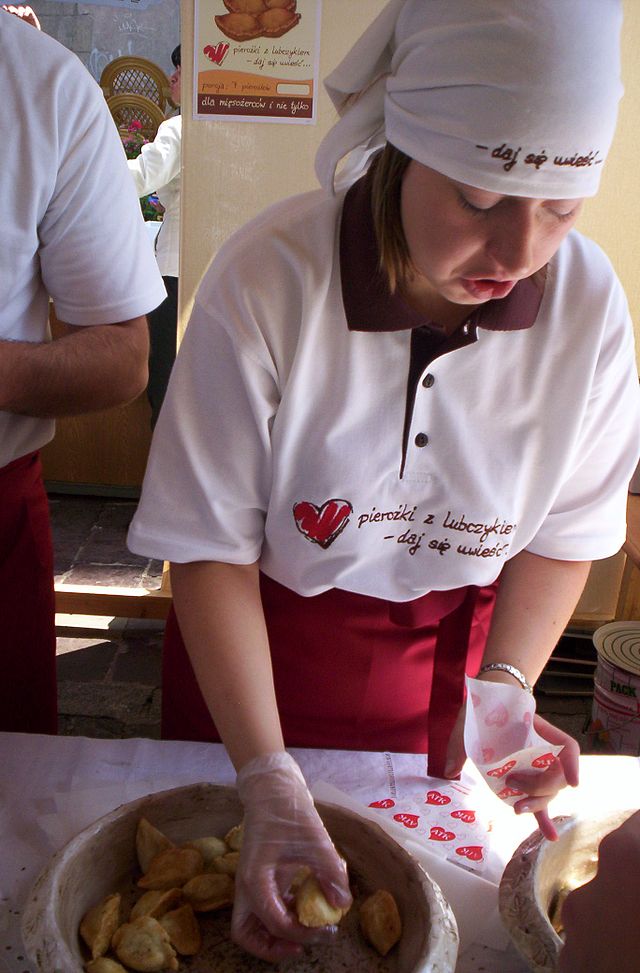
2004 was the beginning of staffing problems concerning Poles in Greenpoint. I often served the breakfast grill because there was no one else to work. Then these problems got worse. Meanwhile, I started spontaneously supporting artists. Discreetly, naturally, being an opera lover myself. And music, more broadly.
In my house, located near Christina’s, I organized music evenings. One day I met a young singer, Mariusz Kwiecień, who came to the Metropolitan Opera for two years on a Young Artist Program scholarship. Currently, a lot of Poles get into the program. Back then, the world wasn’t so open. Mariusz rented an apartment on the same street. I told him to come over for lunch or dinner. He tried to be independent, but I knew he was alone in New York, and I was glad I could support a young and ambitious man.
Through Mariusz, I met other people from this world. Małgosia Walewska, who stayed with me many times. Piotrek Beczała – a novice tenor at the Metropolitan Opera. He came to my Christmas Party. He came with his wife. She said she hadn’t had so much fun in a long time. Aleksandra Kurzak, a soprano singer who visited me on Christmas Eve. She sang at a spectacle that day. A friend called to see if she could come to me after a performance with Aleksandra. Of course, we reheated food for her. In interviews, she even mentioned that when she was alone on Christmas Eve in New York, someone welcomed her and was warm. Then she began to come with her husband, Roberto, and their daughter. I continued these relationships. They had culinary and housing support in me, and I had great company. We all got along very well.
The changes in Greenpoint are that old tenants are being thrown out to let the modern American generation pay more for renting apartments in this neighborhood. I’m trembling about what will happen with the rent. The house where I rent a restaurant belongs to a gentleman of Jewish descent. He didn’t want to sell it to me, but he’s not raising the rent yet. At least drastically. But what if he decides to raise the rent?

New restaurants are being opened around. They are already on every corner. During weekends we are still full, but during the week, the restaurant is empty, maybe except for the regular guests, such as the old American gentleman who for years would come every morning, sit with his coffee and a newspaper by the window. He always told me when he was leaving the city so as not to worry. Unfortunately, he passed away last year.
I’m currently making a menu primarily for Americans. I removed the things that were not being ordered. Beef in horseradish sauce is no longer sold. One in a hundred people will ask about beef, yet horseradish sauce can only stand for a short time. Minced cutlets sell similarly poorly, so I replaced them with meatballs in mushroom sauce. New Greenpoint residents now have specific lunch orders, so I reduced the menu to classic Polish dishes. This modern generation comes for pancakes, bigos, stuffed cabbage, dumplings, and sausage. Because it is increasingly challenging to run such a business, there may come a time when I will decide to sell it. Then I’ll start enjoying life, preferably in Europe.


